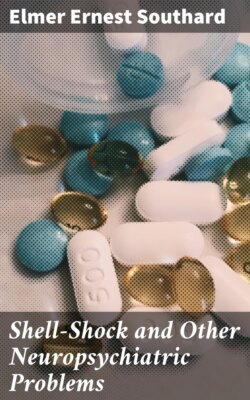Читать книгу Shell-Shock and Other Neuropsychiatric Problems - Elmer Ernest Southard - Страница 13
На сайте Литреса книга снята с продажи.
ОглавлениеNeurosyphilis may be aggravated or accelerated under war conditions.
Case 3. (Weygandt, May, 1915.)
A German, long alcoholic and thought to be weakminded, volunteered, but shortly had to be released from service. He began to be forgetful and obstinate, cried, and even appeared to be subject to hallucinations. The pupils were unequal and sluggish. The uvula hung to the right. The left knee-jerk was lively, right weak. Fine tremors of hands. Hypalgesia of backs of hands. Stumbling speech. Attention poor.
It appeared that he had been infected with syphilis in 1881 and in 1903 had had an ulcer of the left leg.
The military commission denied that his service had brought about the disease.
Case 4. (Hurst, April, 1917.)
An English colonel thought himself perfectly fit when he went out with the original Expeditionary Force. He had had leg pains, regarded as due to rheumatism or neuritis. He was invalided home after exhaustion on the great retreat. He was now found to be suffering from a severe tabes. He improved greatly under rest and antisyphilitic treatment. He has now returned to duty.
Case 5. (Beaton, May, 1915.)
An apparently healthy man, serving on an English battle-ship, severed a tendon in a finger. The injury was regarded as minor. The tendon was sutured and the wound healed. During the man’s convalescence he was accidentally discovered to have an Argyll-Robertson pupil and some excess reflexes. Neurosyphilis had probably antedated the accident. But from the moment of this trivial injury, the disease advanced rapidly.
